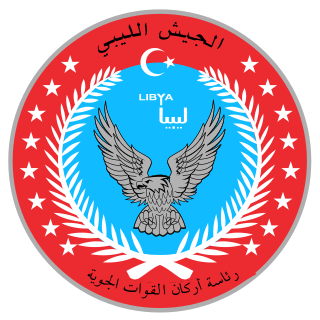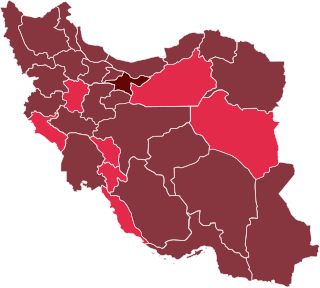
The Libyan Air Force is the branch of the Libyan military responsible for aerial warfare. In 2010, before the Libyan Civil War, the Libyan Air Force personnel strength was estimated at 18,000, with an inventory of 374 combat capable aircraft operating from 13 military airbases in Libya. Since the 2011 civil war and the ongoing conflict, multiple factions fighting in Libya are in possession of military aircraft. As of 2019 the Libyan Air Force is nominally under the control of the internationally recognised Government of National Accord in Tripoli, though the rival Libyan National Army of Marshal Khalifa Haftar also has a significant air force.

Mahmoud Jibril el-Warfally, also transcribed Jabril or Jebril or Gebril, was a Libyan politician who served as the interim Prime Minister of Libya for seven and a half months during the Libyan Civil War, chairing the executive board of the National Transitional Council (NTC) from 5 March to 23 October 2011. He also served as the Head of International Affairs. As of July 2012, Jibril was the head of one of the largest political parties in Libya, the National Forces Alliance.

Field Marshal Khalifa Belqasim Haftar is the commander of the Libyan National Army (LNA). Under Haftar's leadership, the LNA replaced nine elected municipal councils with military administrators, and as of May 2019, was engaged in the Second Libyan Civil War. On 2 March 2015, he was appointed commander of the armed forces loyal to the elected legislative body, the Libyan House of Representatives. On April 27, 2020, Haftar made a televised address where he declared that the LNA would accept a popular mandate to govern Libya. He stated the LNA would establish civic institutions so people can elect their governments democratically.

The Libyan Army is the land warfare branch of the military of Libya, which since December 2015 has been nominally subordinated to the internationally recognised Government of National Accord (GNA) based in Tripoli. Due to the instability in the country in 2011 civil war and the outbreak of a new conflict in 2014, the Libyan ground forces remain highly divided, with major components constituting the Libyan National Army (LNA) under the command of Khalifa Haftar. The forces loyal to the GNA have been fighting against various other factions in Libya, as well as terrorists groups like the Islamic State. Some efforts have been made to create a truly national army, but most of the forces under the Tripoli government's command consist of various militia groups, such as the Tripoli Protection Force, and local factions from cities like Misrata and Zintan.

The Second Libyan Civil War is an ongoing conflict among rival factions seeking control of Libya. After erupting in 2014, the conflict is mostly between :

The Government of National Accord is an interim government for Libya that was formed under the terms of the Libyan Political Agreement, a United Nations-led initiative, signed on 17 December 2015. The agreement was unanimously endorsed by the United Nations Security Council, which welcomed the formation of a Presidency Council for Libya and recognized the Government of National Accord as the sole legitimate executive authority in Libya. On 31 December 2015, Chairman of the Libyan House of Representatives, Aguila Saleh Issa declared his support for the Libyan Political Agreement. During 2015–2017, the General National Congress criticized the unity government on multiple fronts as biased in favor of its rivals, the House of Representatives.
This is a detailed timeline of the Libyan Civil War since 2014.
Clashes have been ongoing in West Libya since 14 October 2016. A coup d'état attempt was conducted by the former head of the National Salvation Government Khalifa al-Ghawil against Prime Minister Fayez al-Sarraj, the head of Libya's GNA Government.

In late January 2019, the Libyan National Army (LNA) led by Marshal Khalifa Haftar launched an offensive to take control of the city of Sabha and the rest of southern Libya from the internationally recognised Government of National Accord (GNA) and local factions. Officially the LNA announced that the reason for the operation was to remove terrorists, Chadian rebel groups, and to secure the border, but it has expanded Haftar's territorial control and acquired him oil fields near Sabha. It has also restarted some interethnic conflicts as the LNA has allied with local Arab tribes, while the Tuareg and Toubou tribal militias are loyal to the GNA.

The Western Libya offensive, code-named Operation Flood of Dignity, is a military campaign by the Libyan National Army under Field Marshal Khalifa Haftar, which represents the Libyan House of Representatives, to capture the western region of Libya and eventually the capital Tripoli held by the UN Security Council-recognised Government of National Accord.

During the 2019–20 coronavirus pandemic, Iran reported its first confirmed cases of SARS-CoV-2 infections on 19 February 2020 in Qom. The virus may have been brought to the country by a merchant from Qom who had travelled to China.
The 2019–20 coronavirus pandemic was confirmed to have reached Lebanon in February 2020.

The 2019–20 coronavirus pandemic was confirmed to have spread to Azerbaijan when its first case was confirmed in February 2020.
The 2020 coronavirus pandemic was confirmed to have spread to Panama on 9 March 2020. As of 8 April 2020, Panama reported 2528 cases, 63 deaths and 16 recoveries. One of the dead was a 64-year-old male, who also suffered from complications of diabetes and pneumonia. Of those infected, 83 were admitted to hospital. The infected individuals belong to the 29-59 age group and had each recently travelled abroad. A 13-year-old girl died of Covid-19 on 23 March.

During the 2019–20 coronavirus pandemic, human rights violations including censorship, discrimination, arbitrary detention, xenophobia were reported from different parts of the world. Amnesty International has responded that "Human rights violations hinder, rather than facilitate, responses to public health emergencies, and undercut their efficiency." The World Health Organization has stated that stay-at-home measures for slowing down the pandemic must not be done at the expense of human rights.

As part of an ongoing worldwide pandemic, the first two patients with COVID-19 in Venezuela were confirmed on 13 March 2020; the first death was reported on 26 March. However, the first record of a patient claiming to have symptoms of coronavirus disease dates back to 29 February 2020, with government officials suspecting that the first person carrying the virus could have entered the country as early as 25 February.
The 2019–20 coronavirus pandemic reached Djibouti on 18 March 2020.
The 2019–20 coronavirus pandemic was confirmed to have reached Somalia on 16 March 2020 when the first case was confirmed in Mogadishu. There is great concern about the effects of COVID-19 in Somalia, due to the country's lawlessness, lack of control by the central government as well as the lack of healthcare infrastructure. There are also 7 cases in Puntland all happening on April 26 2020.
The following lists events that happened during 2020 in North Africa. The countries listed are those described in the United Nations geoscheme for Africa: Algeria, Egypt, Libya, Morocco, Sahrawi Arab Democratic Republic, Sudan, Tunisia, and Western Sahara












